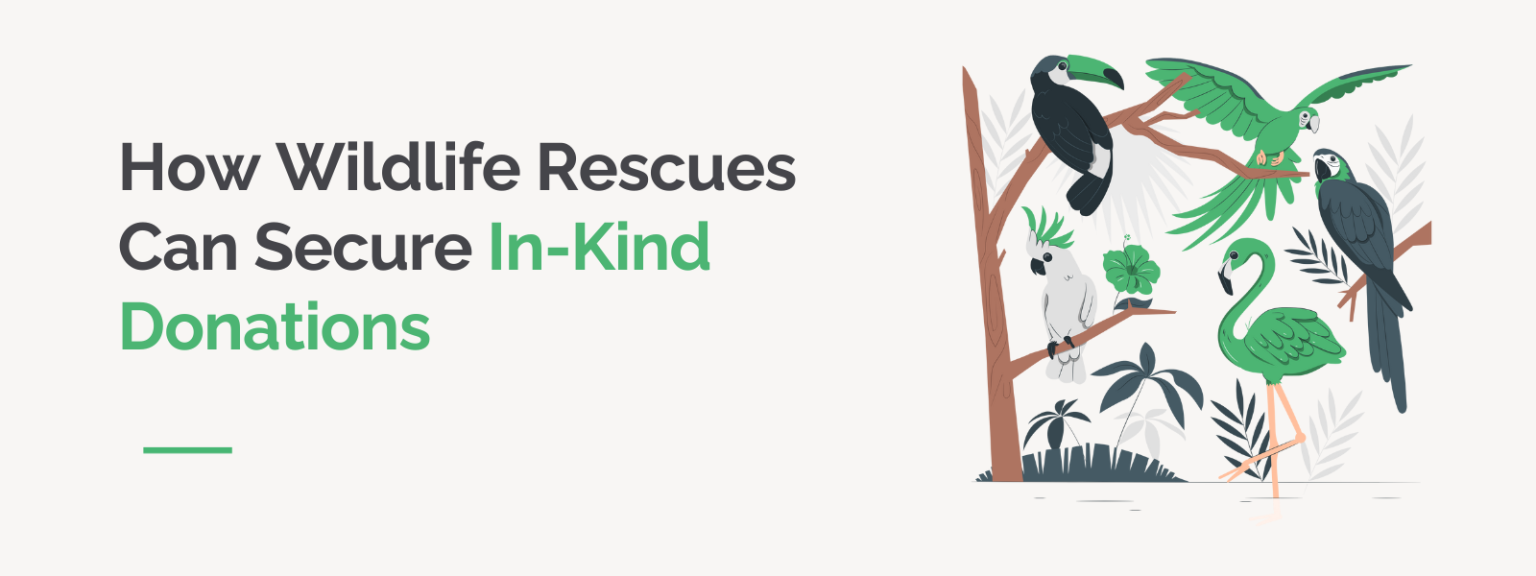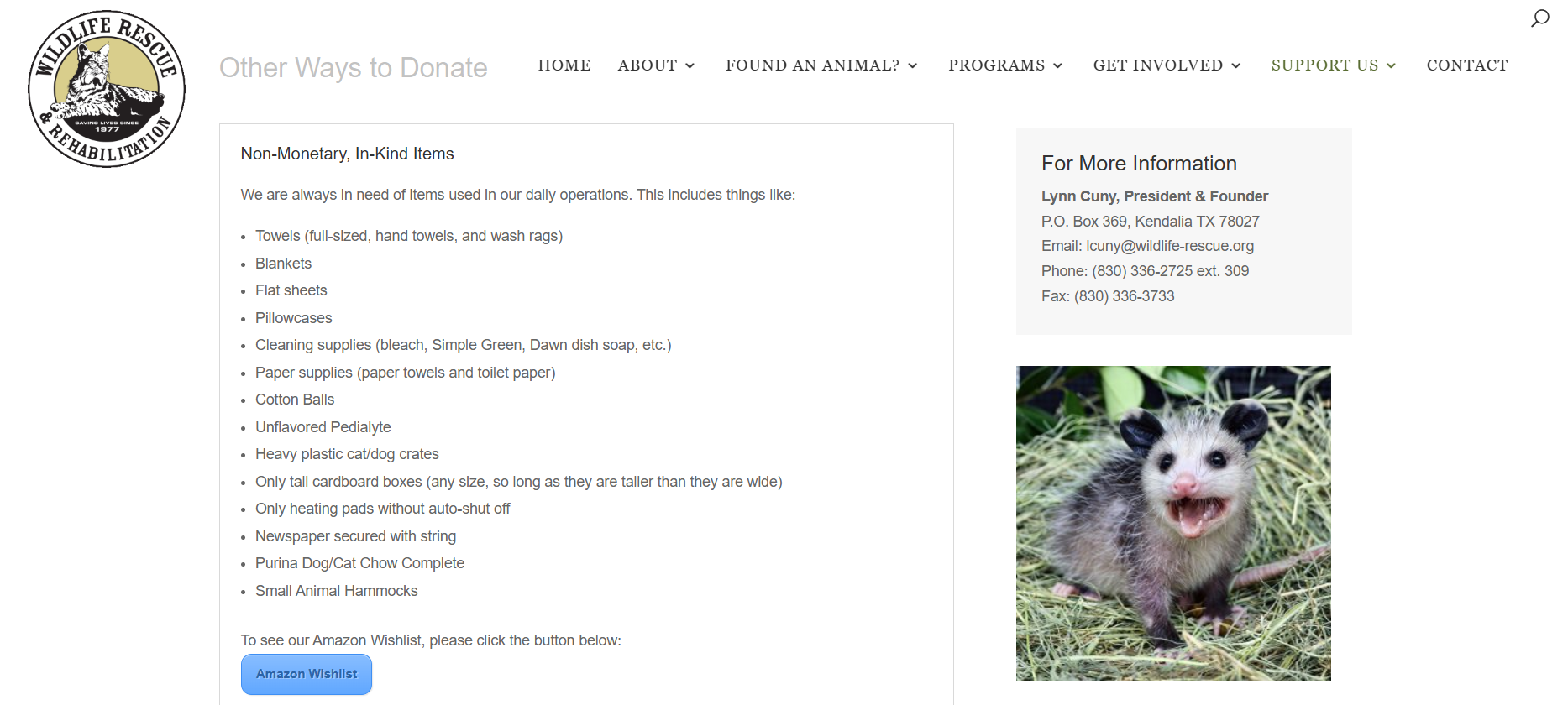How Wildlife Rescues Can Secure In-Kind Donations
Wildlife rescues play a vital role in protecting and rehabilitating animals in need, often operating with limited budgets and resources. Accessing in-kind donations is a strategic way these organizations can stretch their funds further while acquiring essential goods and services. In-kind donations refer to non-cash gifts that directly support the mission, such as supplies, equipment, or professional services. For wildlife rescues, these contributions can be game-changers, providing the materials necessary to care for animals and maintain facilities without impacting financial reserves.
For nonprofit professionals working in wildlife rescues, understanding how to identify, request, and manage in-kind donations is crucial. This article will explore the types of in-kind donations most valuable to wildlife rescues, where to find potential donors, and best practices for making effective donation requests. Leveraging these strategies can help your organization maximize impact and build lasting relationships with corporate partners.
Table of Contents
- What Are In-Kind Donations for Wildlife Rescues?
- Types of In-Kind Donations for Wildlife Rescues
- Where Wildlife Rescues Should Look for In-Kind Support
- How Wildlife Rescues Should Make the In-Kind Donation Ask
- Tools and Resources to Help Wildlife Rescues Get Started
- How One Wildlife Rescue & Rehabilitation Secures In-Kind Donations
What Are In-Kind Donations for Wildlife Rescues?
In-kind donations are contributions of goods or services rather than money. These gifts can range from physical items, such as equipment and supplies, to professional services, including legal advice or transportation support. Across all nonprofit sectors, in-kind donations complement cash gifts by providing resources that directly support an organization’s operations and mission delivery.
Unlike cash donations, which offer flexibility in how funds are used, in-kind donations are often targeted to specific needs. This specificity can be advantageous for nonprofits because it ensures that critical resources are provided without diverting limited financial assets. However, it also requires clear communication about what is needed and how donated items or services will be utilized.
For wildlife rescues, in-kind donations are particularly impactful. These organizations frequently require specialized supplies such as animal feed, bedding, cages, and outdoor materials to create safe and comfortable environments for rescued animals. Transportation equipment is also essential for moving animals safely between locations or to veterinary appointments. In-kind gifts help wildlife rescues maintain high standards of care while conserving precious financial resources.
Moreover, in-kind donations can strengthen community ties by involving local businesses and corporations that share a commitment to animal welfare and environmental stewardship. By aligning donation requests with the mission and operational needs, wildlife rescues can build mutually beneficial partnerships that enhance their capacity to save and rehabilitate wildlife.
How In-Kind Donations Differ from Cash Gifts
While cash gifts provide nonprofits with the flexibility to allocate funds where they are most needed, in-kind donations offer specific resources that might otherwise be costly or difficult to procure. For wildlife rescues, this means receiving items like feed or cages directly reduces expenses and ensures that animals receive appropriate care materials promptly.
Additionally, in-kind donations often come with opportunities for corporate engagement beyond financial support, such as employee volunteer programs or joint awareness campaigns. This can deepen the relationship between the nonprofit and the donor, creating a more sustainable support network.
Types of In-Kind Donations for Wildlife Rescues
Wildlife rescues benefit from a diverse range of in-kind donations that support both daily operations and long-term program success. Below are some of the most valuable types of in-kind gifts tailored to the unique needs of these organizations.
Feed and Nutritional Supplies
Animal feed is a fundamental need for wildlife rescues. Donations of specialized feed tailored to different species ensure that animals receive proper nutrition during rehabilitation. This type of donation has a direct impact on animal health and recovery, thereby reducing the financial burden on the rescue.
Bedding and Comfort Materials
Soft bedding materials such as straw, blankets, or specialized animal-safe padding provide comfort and warmth to rescued wildlife. These donations enhance animal welfare by providing safe resting environments, which are crucial for stress reduction and recovery.
Cages and Enclosures
Secure cages and enclosures are essential for housing animals safely, especially those that are injured or require quarantine. Donations of cages, pens, or modular enclosures help rescues expand their capacity and ensure animals are protected from harm or escape.
Outdoor Materials and Habitat Supplies
Materials like fencing, shelter-building supplies, and natural habitat enhancements enable rescues to create or improve outdoor enclosures that mimic natural environments. These donations support behavioral enrichment and prepare animals for eventual release back into the wild.
Transportation Equipment
Safe and reliable transportation equipment, including crates, carriers, and vehicles, is vital for moving animals between rescue sites, veterinary clinics, or release locations. Donations in this category help rescues manage logistics efficiently and reduce stress on animals during transit.
Professional Services and Skilled Volunteer Support
Beyond physical goods, wildlife rescues also benefit from donated services, including veterinary care, legal advice, marketing support, and transportation services. Skilled volunteers offering their expertise can fill critical gaps and enhance an organization’s capacity without incurring additional costs.
Where Wildlife Rescues Should Look for In-Kind Support
Identifying the right sources for in-kind donations requires strategic research and relationship-building. Industry-relevant retailers, manufacturers, and service providers often have established giving programs or are open to customized partnerships. Approaching companies whose products or services naturally complement the needs of wildlife rescues increases the likelihood of successful donations.
Take a look at some leading companies with existing in-kind donation programs here:
Chewy
Chewy specializes in pet food and supplies, making it an excellent source for feed and bedding donations. Their commitment to animal welfare aligns closely with wildlife rescue missions, and they often support nonprofits through product donations and fundraising partnerships.
Petco
Petco offers a range of pet care products, including cages, bedding, and nutritional supplies. Their community giving programs focus on animal health and rescue efforts, providing valuable in-kind support that directly benefits wildlife rescues.
PetSmart
PetSmart supports animal welfare organizations through donations of supplies and hosting adoption events. Their in-kind contributions often include cages, food, and enrichment materials, which are critical for wildlife rescue operations.
Home Depot
Home Depot provides outdoor materials such as fencing, lumber, and shelter-building supplies. Their community impact initiatives frequently support environmental and animal-focused nonprofits, making them a strategic partner for habitat enhancement projects.
FedEx
FedEx can support wildlife rescues with transportation services or discounted shipping for donated goods. Their CSR efforts emphasize community support and logistics solutions, which align well with the needs of animal transport and supply delivery.
How Wildlife Rescues Should Make the In-Kind Donation Ask
Making a thoughtful and strategic in-kind donation request is essential for building lasting corporate partnerships. A well-crafted ask demonstrates professionalism, aligns the nonprofit’s needs with the company’s values, and makes it easy for donors to say yes. Here’s what you can do to drive positive results:
Personalize Your Outreach
Research each potential donor’s CSR focus and tailor your message to highlight shared values. Reference any previous support or community involvement to build rapport and demonstrate genuine interest.
Be Clear and Specific
Detail exactly what you need and why it matters. For example, specify the types of feed or cages required and how these donations will improve animal care or operational efficiency.
Highlight Mutual Benefits
Explain how the company’s support will enhance their brand reputation, engage employees, or fulfill corporate giving goals. Emphasize the positive community impact their donation will create.
Offer Flexible Giving Options
Allow donors to choose from various ways to contribute, whether through product donations, services, gift cards, or event participation. Flexibility increases the likelihood of securing support.
Make It Easy to Give
Provide all necessary details upfront, including wish lists, shipping addresses, deadlines, and contact information. Clear instructions reduce barriers and encourage prompt action.
Tools and Resources to Help Wildlife Rescues Get Started
Securing in-kind donations can be complex, but dedicated tools can simplify the process. Many companies have formal donation programs with specific application procedures, eligibility criteria, and deadlines. Tracking these opportunities manually can be time-consuming and inefficient.
Using specialized platforms helps wildlife rescues uncover corporate giving programs that align with their mission quickly. These tools provide centralized access to application links, program details, and contact information, saving valuable staff time and effort.
Additionally, such resources enable nonprofits to organize outreach efforts, monitor responses, and expand their network of potential in-kind donors. This strategic approach increases the chances of securing meaningful support and building sustainable partnerships.
Double the Donation’s Corporate Giving Program Database
Double the Donation offers a comprehensive database of thousands of verified corporate giving programs, including in-kind donations, grants, and workplace giving opportunities. This platform empowers wildlife rescues to identify companies with relevant donation programs and access application details in one place.
By leveraging Double the Donation, nonprofit professionals can streamline their research, improve outreach efficiency, and uncover new partnership opportunities. This data-driven approach supports smarter fundraising strategies that maximize impact and resource acquisition.
How One Wildlife Rescue & Rehabilitation Secures In-Kind Donations
Wildlife Rescue & Rehabilitation (WRR) provides a practical roadmap for how specialized animal welfare organizations can secure high-volume in-kind support for their daily operations. By maintaining a dedicated “Non-Monetary, In-Kind Items” section within their digital giving portal, the rescue ensures that local businesses and individual supporters can provide the tangible tools necessary for wildlife rehabilitation.
View the web page here: https://www.wildlife-rescue.org/other-donations/
Building an Impact-Focused Supplies List
The core of the WRR strategy is a highly detailed and accessible wishlist that categorizes needs into essential daily supplies. This specificity allows donors (ranging from local retailers to household supporters) to immediately understand how their physical contributions translate into animal comfort and care.
The rescue prioritizes several mission-critical categories for in-kind support:
- Medical and Sanitization Supplies: The organization solicits essential cleaning items like bleach, dish soap, and paper products to maintain sterile environments.
- Linens and Bedding: Constant needs for towels, blankets, flat sheets, and pillowcases are highlighted to support the comfort of recovering animals.
- Specialized Animal Housing: WRR requests specific items such as heavy plastic crates, tall cardboard boxes, and small animal hammocks to facilitate safe rehabilitation.
- Dietary Needs: The list includes specific nutritional requirements, ranging from unflavored Pedialyte to standard dog and cat chow.
To reduce friction in physical donation logistics, WRR uses an integrated Amazon Wishlist button on its page. This digital tool allows supporters to purchase pre-vetted, high-priority items that ship directly to the rescue, bypassing the need for coordinated drop-offs. For more complex or bulk corporate donations, the organization provides direct contact information for its leadership to ensure logistics are handled efficiently.
Wrapping Up & Next Steps
Securing in-kind donations is a powerful strategy for wildlife rescues to enhance their capacity and deliver exceptional care to animals. By identifying specific needs, researching aligned corporate partners, and making thoughtful, personalized donation requests, nonprofits can unlock valuable resources that extend their impact.
Leveraging tools like Double the Donation’s corporate giving database streamlines the process, saving time and expanding opportunities. With a strategic approach to in-kind donations, wildlife rescues can establish sustainable partnerships that support their mission and foster stronger community ties.
Taking the first steps—such as creating a detailed wish list, identifying potential donors, and using dedicated resources—can set your organization on a path to greater success in securing the non-cash support essential for thriving wildlife rescue operations.
Unlock More Support with Double the Donation
Corporate sponsorships and in-kind donations are critical to the success of nonprofit events and programs—but sourcing the right partners can be time-consuming and overwhelming. Luckily, you can raise more with corporate grants and in-kind gifts using Double the Donation.
Double the Donation streamlines the entire process, helping your team find, secure, and manage corporate support with ease. With our industry-leading corporate giving database, you can quickly identify companies that offer financial sponsorships, in-kind donations, and corporate grants—giving you a data-driven edge in building meaningful partnerships. It’s never been easier. All you need to do to get started is request a demo here!





